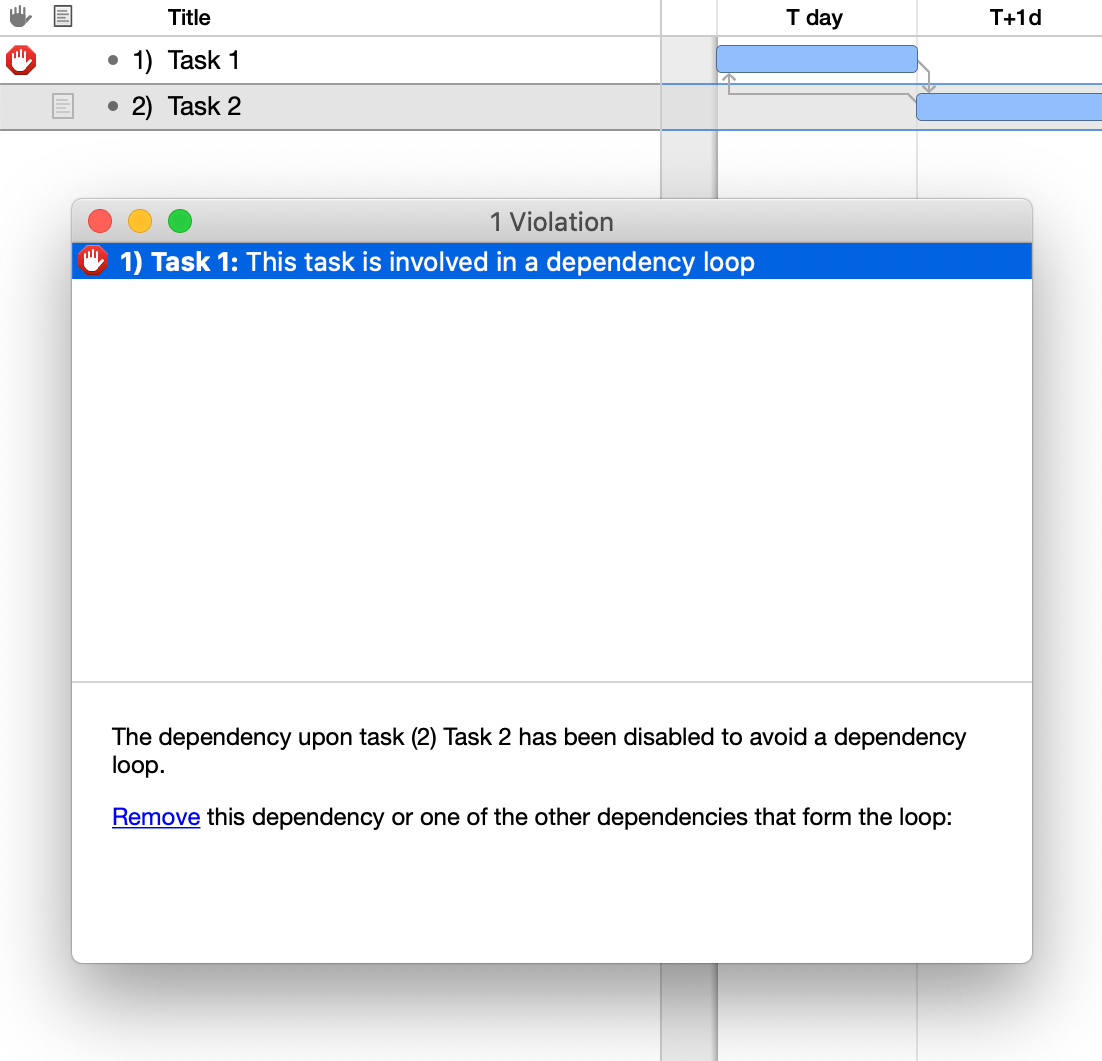Resolving Violations
Occasionally situations will emerge that break the rules of logic you have set up for your project. When one of these occurs, OmniPlan will let you know by indicating a violation related to the adjacent task. A red icon appears in the Violations column of your task outline, which you can click to open the Violations Window.
If an error has occurred in your project, the Violations Window lets you know what is wrong. You can open it by clicking on the icon in the Violations column of Gantt View, the Violations button in the toolbar, or with Window > Violations (Shift-Command-V).

This window lists all of the violations in the project, along with explanations of why they have occurred. Most explanations include links you can click to immediately resolve the problem.
If the automated resolution provided by the Violations Window is not what you want, tips at the bottom of the window will help determine the source of the problem so you can fix it based on your scheduling needs.
Types of Violations
| Violation | Description |
|---|---|
| Errors | |
| More resources assigned than are available | More resources are assigned to this task than are available in the project. X has Y total currently assigned. |
| Constraints too close together | The start and end constraints are too close together to contain the entire duration of this task. |
| X constraint hit due to prerequisites | This task cannot start on or before its start constraint date due to prerequisites. |
| X constraint hit due to dependents | The possible end date of this task, minus its duration, makes it start before its start constraint date. |
| ASAP/ALAP task unable to be scheduled | This as-late-as-possible task can’t be scheduled because there is not enough time for it in between its prerequisite and dependent tasks. |
| Task ends after group’s end constraint date | The scheduled end date of this task occurs after its group’s end constraint date. |
| This task is involved in a dependency loop | The dependency upon task (X) Y has been disabled to avoid a dependency loop. |
| Hammock task doesn’t have start and end prerequisites | This hammock task does not have a dependency connected to both its start and its end, and so its duration is indeterminate. |
| Manual date set before prerequisites complete | This task's dates are set to manual, but it can't begin on its current date because its prerequisites won't yet be completed. |
| Manual date set earlier than no-earlier-than constraint date | This task is set to manual dates, but it can’t begin on its current date because it also has a no-earlier-than constraint that says it must begin later. |
| Scheduled outside of resource work time | There is not enough work time remaining for the resources assigned to this task for it to be completable. |
| Task ends after project’s end date | The scheduled end date of this task occurs after the project end date. |
| Task starts before project’s start date | The scheduled start date of this task occurs before the project start date. |
| Warnings | |
| Couldn’t fit task during resource leveling | This task couldn’t be fully resource leveled and therefore the resources it is assigned to may remain overloaded. The task hasn’t been moved. Resource leveling failed because there wasn’t enough time to perform the task while honoring these constraints. |
| Maximum effort exceeded | OmniPlan supports a maximum of 20 years duration or 100 person-years of effort for a single task. This task was either set directly to a larger value, or the effort in the plan file was corrupted. |
| Reserve time lost from OmniPlan 1.x | This group contained reserve time in OmniPlan 1.x, which is an attribute that no longer exists in current versions of OmniPlan. That reserve time value is now missing. No other scheduling information has been affected. |